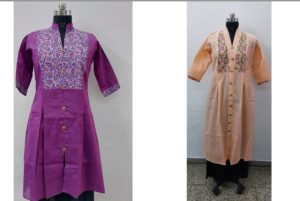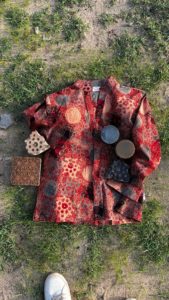On August 7, National Handloom Day, Prime Minister Narendra Modi launched the e-portal ‘Bhartiya Vastra evam Shilpa Kosh – A Repository of Textiles & Crafts’ to showcase the versatility of Indian handloom products and their creators. In a world increasingly concerned about global warming, the eco-friendly textiles of India are making waves worldwide. Uttara Gangopadhayay reports
By Uttara Gangopadhayay
 During the Independence movement, one of the main thrusts of Mahatma Gandhi’s campaign was on discarding foreign textiles and encouraging the use of homespun materials like khadi instead to ensure self- sufficiency and generate rural employment. Today, the demand and recognition of Indian handlooms for its variety and eco-friendly quality has crossed across the borders to make a mark, especially in a world where global warming is creating havoc everywhere as the recent events show.
During the Independence movement, one of the main thrusts of Mahatma Gandhi’s campaign was on discarding foreign textiles and encouraging the use of homespun materials like khadi instead to ensure self- sufficiency and generate rural employment. Today, the demand and recognition of Indian handlooms for its variety and eco-friendly quality has crossed across the borders to make a mark, especially in a world where global warming is creating havoc everywhere as the recent events show.
In this context , Prime Minister Narendra Modi’s launching of the ‘Bhartiya Vastra evam Shilpa Kosh – A Repository of Textiles & Crafts’ on the National Handloom Day ( 7 August) is a timely step to expand even further the scope of the rich Indian handloom products and highlight the skill of the artisans.
Addressing the event at Bharat Mandapam in the Pragati Maidan, New Delhi, Modi said, “The India of today is not just ‘Vocal for Local’ but also providing a global platform to take it to the world.”
Rita Das of Rita Design, Jaipur, who uses only handloom products for her apparels, says that the versatility of India’s textiles is amazing and can be adapted to different needs. Das is also empanelled in the Khadi Village Industry Commission (KVIC) and asserts that khadi cotton fabric is a material that “can keep you cool in summer and warm in winter.”
 She points out that today khadi has moved a long way from the rough textured material it was associated with earlier due to innovations and experimentations in the sector. Recently, Das designed yoga mats in khadi fabric ahead of the World Yoga Day (21 June) for KVIC which became a huge hit.
She points out that today khadi has moved a long way from the rough textured material it was associated with earlier due to innovations and experimentations in the sector. Recently, Das designed yoga mats in khadi fabric ahead of the World Yoga Day (21 June) for KVIC which became a huge hit.
While expiating this traditional sector, there are, however, points to ponder on the role of women too. According to the Handloom Census (2019-20) undertaken by the Union Ministry of Textiles, India has nearly 35,22,512 handloom workers employed across the country, out of which 72 per cent or around 25,46,285 are women workers.
“Although women form the backbone of the handloom sector, their significant contribution often goes unnoticed,” says Debaraoopa Bhattacharya, founder, Ummaira, Kolkata, an ethnic apparel brand which has been closely working with the sector.
According to a 2021 report by NABARD, the handloom sector, the second largest employer after agriculture and dominated by women, is characterised by households having low levels of education, low levels of income ridden with high inequalities and low credit penetration.
Many women entrepreneurs owning boutique apparel brands echo Bhattacharya.
 Matrika Bhandari, co-founder, Inkriti, Kolkata, says, “It’s always amazing to see women artisans break free of social boundaries and rise in various crafts like patachitra of Bengal, kalamkari of Andhra Pradesh, and embroidery work. However, in the case of handlooms, history shows their involvement in supporting activities rather than the main act of weaving.”
Matrika Bhandari, co-founder, Inkriti, Kolkata, says, “It’s always amazing to see women artisans break free of social boundaries and rise in various crafts like patachitra of Bengal, kalamkari of Andhra Pradesh, and embroidery work. However, in the case of handlooms, history shows their involvement in supporting activities rather than the main act of weaving.”
According to Bhattacharya, “Strengthening education, promoting self-employment, and empowering women politically and socially are essential steps to empower them and enable them to make and implement decisions for themselves and their craft. It’s time to recognise their dedication and empower them further to take centre stage in the handloom journey.”
Drawing from her own experience, Bhandari says, “Education and awareness have played a crucial role in empowering women artisans, as I have personally witnessed through my work with Somaiya Kala Vidya in Kutch, Gujarat.”
Now design education and skill-training programs are enabling traditional artisans to encourage their daughters and family members to pursue crafts more holistically, she said.
 According to the label Vilasa, the growing consciousness about slow and genuine handcrafted products has led to a renewed demand for handloom products, empowering females to play diverse roles in the traditionally male-dominated industry.
According to the label Vilasa, the growing consciousness about slow and genuine handcrafted products has led to a renewed demand for handloom products, empowering females to play diverse roles in the traditionally male-dominated industry.
Sreya Samanta, running the eponymous label, reiterates, “Traditionally, the handloom industry was male-oriented, with women confined to supporting roles or household-based activities like spinning yarns. However, key factors such as growing awareness, changing societal attitudes, market demand for sustainable products, and economic necessity have empowered females to break barriers and embrace diverse roles in the handloom sector.”
In their own way the boutiques, especially those led by women, are also coming forward to empower the women workers.
Meanwhile, governments at both the state and Centre levels are implementing various programmes for overall improvement of the sector. To help the weavers’ productivity, computer-operated punching machines are being provided to enable the creation of new designs at a fast pace. The government is also providing raw materials like yarn to handloom weavers at concessional rates and also bearing the cost of transporting the raw material.
 A heartening factor is that the turnover of Khadi and Village industries has reached more than 1.3 lakh crore rupees now.
A heartening factor is that the turnover of Khadi and Village industries has reached more than 1.3 lakh crore rupees now.
“India possesses a beautiful rainbow of clothing,” the Prime Minister said as he observed the diversity in clothing ranging from the tribal communities in far-fetched areas to people living in the snow-clad mountains, and from people in the coastal regions to those living in the desert as well as the clothing available in the markets of India.
Trans World Features



